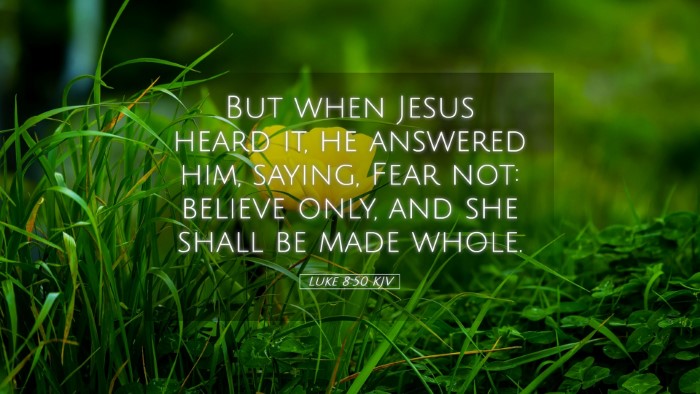Commentary on Luke 8:50
“But when Jesus heard it, he answered him, saying, Fear not: believe only, and she shall be made whole.”
Introduction
The verse under consideration is rich in theological insights and practical applications, particularly in the context of faith and fear. In this commentary, we will explore the implications of Jesus' words both for the immediate narrative and for broader Christian life, drawing from esteemed public domain commentaries.
Contextual Background
Before delving deeper, it is crucial to grasp the situational context in which this verse appears. Jesus is approached by Jairus, a ruler of the synagogue, who is desperately seeking healing for his dying daughter. During this moment, Jairus receives the devastating news of his daughter's death. Jesus's immediate response is one of reassurance.
Matthew Henry's Insight
Matthew Henry highlights the emotional state of Jairus amidst this crisis. He emphasizes how fear often accompanies despair, and Jesus' words serve both as comfort and a command. Henry notes that “fear not” implies that the fear of death is conquered by faith in Christ. His encouragement to “believe only” aligns with the biblical theme of faith being paramount to experiencing God's restorative power.
Albert Barnes' Reflection
Albert Barnes expands on the concept of faith as a precursor to healing. He suggests that Jesus did not merely offer a platitude; rather, He was calling Jairus to maintain his faith even in the face of death. For Barnes, the dual call to “fear not” and “believe” is a clear affirmation that faith in Christ has the power to change circumstances, regardless of how dire they appear. Barnes further remarks that Jesus’ intervention reflects the divine authority He possesses over life and death.
Adam Clarke's Perspective
Adam Clarke approaches this verse with a pastoral heart, remarking on the importance of sustaining faith in the presence of fear. He underscores how Jesus appeals to Jairus' belief as the means by which his daughter would be “made whole.” Clarke argues that this moment represents a profound teaching on the nature of healing, not merely as a physical restoration but as a holistic reestablishment of life and purpose. Clarke also stresses that “believing only” speaks to the singular focus of faith, devoid of distractions or doubts.
Theological Insights
Fear and Faith
At the core of this passage is the juxtaposition of fear and faith. Jesus acknowledges Jairus's fear but implores him to rise above it. This reinforces a critical theological principle: faith is often most potent in the context of fear. The believer's confidence is not in the absence of trials, but in the steadfastness of Christ's promises.
The Authority of Jesus
Jesus' declaration not only calls for belief but also serves to illustrate His divine authority. The phrase “she shall be made whole” encompasses both physical restoration and spiritual renewal. The authority that Jesus wielded during His earthly ministry extends to believers today, reminding them that faith in Him can intervene in seemingly hopeless situations.
Practical Applications
For Pastors and Leaders
Pastors are urged to communicate the message of hope that Jesus extends in this passage. In times of crisis within their congregations, leaders must remind individuals that fear is a natural response, yet faith can mitigate its influence. The responsibility lies in guiding people towards trusting God despite their circumstances, illustrating that genuine faith can lead to miraculous outcomes.
For Students and Theologians
Theological students and scholars will find value in analyzing the implications of faith evident within this narrative. It invites a critical examination of one’s beliefs, challenging students to consider how fear may hinder their walk with God. The study of this verse encourages deeper exploration into the character of Jesus and the nature of miracles, prompting theological discourse on how faith interfaces with divine intervention.
For Personal Reflection
For the individual believer, this verse presents a poignant opportunity for self-reflection. Consider personal fears—what are the ‘Jairus’ moments in one's own life? How can one cultivate a faith that remains steadfast in the midst of fear? The assurance given by Jesus serves as an invitation to embrace faith actively and intentionally amid life’s uncertainties.
Conclusion
Luke 8:50 captures the essence of Christ's message of hope and healing—a message that transcends time and remains relevant. The insights from Matthew Henry, Albert Barnes, and Adam Clarke collectively emphasize that faith is an antidote to fear, and it is through belief that life can be restored. As such, this verse calls upon believers to not only affirm their faith in Jesus but to act on it, regardless of the circumstances they face.


